|
|
|
Sort Order |
|
|
|
Items / Page
|
|
|
|
|
|
|
| Srl | Item |
| 1 |
ID:
091566
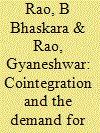

|
|
|
|
|
| Publication |
2009.
|
| Summary/Abstract |
Since the early 1970s, there has been a worldwide upsurge in the price of energy and in particular of gasoline. Therefore, demand functions for energy and its components like gasoline have received much attention. However, since confidence in the estimated demand functions is important for use in policy and forecasting, following [Amarawickrama, H.A., Hunt, L.C., 2008. Electricity demand for Sri Lanka: A time series analysis. Energy Economics 33, 724-739], this paper estimates the demand for gasoline is estimated with five alternative time series techniques with data from Fiji. Estimates with these alternative techniques are very close, and thus increase our confidence in them. We found that gasoline demand is both price and income inelastic.
|
|
|
|
|
|
|
|
|
|
|
|
|
|
|
|
| 2 |
ID:
111173
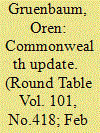

|
|
|
|
|
| Publication |
2012.
|
| Summary/Abstract |
Militant Islamists terrorised Nigeria, killing hundreds in indiscriminate attacks. The Bangladesh army said it had foiled a coup attempt, while in Pakistan the army seemed closer to launching a coup itself. New Zealand's leader won a second term, Jamaica and Guyana elected new ones, but rival prime ministers vied for power in Papua New Guinea. Fiji lifted martial law. South Africa saw a global deal to combat climate change agreed in Durban but the government was criticised for resurrecting apartheid-era controls over the media. A Malaysian judge threw out a sodomy case against the opposition leader Anwar Ibrahim that was widely seen as politically motivated, and the Federated Farmers of New Zealand called for sheep shearing to become an Olympic sport.
|
|
|
|
|
|
|
|
|
|
|
|
|
|
|
|
| 3 |
ID:
085555


|
|
|
| 4 |
ID:
018307
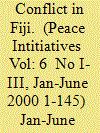

|
|
|
|
|
| Publication |
2000.
|
| Description |
1-145
|
|
|
|
|
|
|
|
|
|
|
|
|
|
|
|
| 5 |
ID:
099748
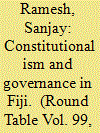

|
|
|
|
|
| Publication |
2010.
|
| Summary/Abstract |
The President of Fiji abrogated the 1997 Constitution in April 2009 and the country was suspended from the Pacific Islands Forum and the Commonwealth, despite Fiji disclosing a potential time line for general elections by 2014 under a new open-list proportional voting system. The European Union subsidy for Fiji's sugar industry was also frozen following accusations that Fiji had breached the 2007 revised Cotonou Agreement, where it promised to hold elections by 2009. This article charts the tensions between the post-2006 coup Fiji government and the 1997 Constitution caused by the legal action from the deposed government, and differences with the Fiji Military Forces Commander Commodore Frank Bainimarama over a quick return to democracy push from the Pacific Islands Forum, the Commonwealth and the European Union. Continued diplomatic pressure from Forum members, Australia and New Zealand increased tensions as Fiji deported the High Commissioners of these two countries in November 2009 and imposed Public Emergency Regulations that curbed freedom of expression of local critics. In what could be seen as a deepening of military rule, Bainimarama clarified in early 2010 that the military would continue to monitor the elected government after the proposed 2014 election and barred mainstream political parties from participating in any future political forum or general elections.
|
|
|
|
|
|
|
|
|
|
|
|
|
|
|
|
| 6 |
ID:
121663
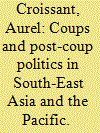

|
|
|
|
|
| Publication |
2013.
|
| Summary/Abstract |
The 2006 coups in Fiji and Thailand-as well as the 2012 incident in Papua New Guinea-have sent timely reminders that military coups remain a threat to vulnerable democracies in South-East Asia and the Pacific. This article explores the interplay between structural factors that can create coup risks, the 'coup-proofing' strategies of political leaders and the occurrence of military coups. While the article examines the region as a whole, it pays particular attention to Myanmar (Burma), Thailand, Indonesia, Fiji and Papua New Guinea. Borrowing from the work of Belkin and Schofer, it argues that the level of coup risk in each country can be assessed by analysing the extent of regime legitimacy, the strength of civil society and the frequency of military coups in the past. By combining this analysis with an evaluation of coup-proofing strategies, the study discusses likely scenarios for the five focus countries as far as the likelihood of coups or, alternatively, the establishment of stable civilian control is concerned.
|
|
|
|
|
|
|
|
|
|
|
|
|
|
|
|
| 7 |
ID:
063865
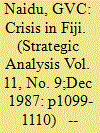

|
|
|
| 8 |
ID:
064160
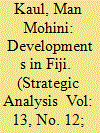

|
|
|
| 9 |
ID:
083228
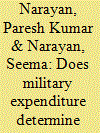

|
|
|
|
|
| Publication |
2008.
|
| Summary/Abstract |
Fiji's total debt stands at 65% of GDP. Domestic debt constitutes 55% of GDP. The goal of this paper is to investigate whether military expenditure has contributed to Fiji's exploding debt levels over the period 1970 to 2005. Our empirical analysis, conducted within a cointegration and vector error-correction framework, suggests that, in the long-run, military expenditure has had a statistically significant positive impact on both external debt and domestic debt, while income has had a statistically significant positive impact on domestic debt and a statistically significant negative impact on external debt. We explain the reasons behind this finding and draw some policy implications.
|
|
|
|
|
|
|
|
|
|
|
|
|
|
|
|
| 10 |
ID:
118019
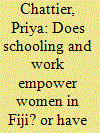

|
|
|
|
|
| Publication |
2013.
|
| Summary/Abstract |
The paper explores the limitations of the theoretical presumptions underlying the relationship between empowerment, education and employment that have been emphasized in both the existing literature and the current rhetoric to 'empower' women in developing countries. The research uses findings from in-depth interviews and focused group discussion data to empirically examine the relationship between schooling, paid work and empowerment of women in Fiji. The paper argues that the relationship between education, work and empowerment is conditioned by gender norms surrounding women's and men's choices on key economic decisions. The findings demonstrate that cultural norms about gender roles are considered to persist, generating gender inequality despite women's and girl's education and employment. Empirical evidence makes a strong case for the need to move away from broad-based conceptualizations of women's empowerment to an analysis of the social construction of gender as both a conceptual and an empirical category of inquiry.
|
|
|
|
|
|
|
|
|
|
|
|
|
|
|
|
| 11 |
ID:
149832
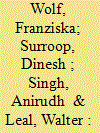

|
|
|
|
|
| Summary/Abstract |
Small Islands Developing States (SIDS) are isolated and surrounded by ocean. The generation and use of energy resources are two very important aspects for the development of SIDS. Unfortunately, most of SIDS do not use their potential in respect of energy resources, and they as a result have to depend on the import of fossil fuels in order to meet their energy needs. This increases the overall vulnerability of SIDS as they have to depend on the rising or fluctuating fossil fuels prices. Some SIDS, especially in the geographically dispersed Pacific region, do not have proper access to energy whereas other SIDS struggle more with energy security issue. At the same time, SIDS are most vulnerable to the impacts and effects of climate change, as they are among the ones to be most severely affected in case of natural calamities and sea-level rise.
|
|
|
|
|
|
|
|
|
|
|
|
|
|
|
|
| 12 |
ID:
022037
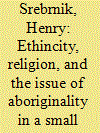

|
|
|
|
|
| Publication |
2002.
|
| Description |
187-210
|
|
|
|
|
|
|
|
|
|
|
|
|
|
|
|
| 13 |
ID:
060733
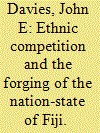

|
|
|
| 14 |
ID:
103957
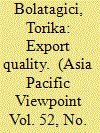

|
|
|
|
|
| Publication |
2011.
|
| Summary/Abstract |
Fijian bodies have become a valuable commodity in the economy of war. Remittances from workers overseas are Fiji's largest income - exceeding that of tourism and sugar export. This essay examines historical and contemporary representations of the black male body that perpetuate the exploitation of Fijians by inscribing the Fijian male body as warrior, criminal and protector. Taking a multidisciplinary approach informed by sociology, cultural theory, Pacific studies, visual culture, feminist and post-colonial theory, my practice is the vehicle through which I address issues of neocolonial commodification of Fijian bodies. Through an analysis of my own staged photographs and vernacular images taken by Fijians working for private security military companies and British and US armies, I hope to challenge audiences to consider their own perceptions of Fijian agency and subjectivity. By theorising the politicisation of the black body and interrogating colonial representations of blackness, I argue that we can begin to create links between the historical and contemporary exploitation of Fijians and that at the essence of both is an underlying racial hierarchy and economic requirement for cheap and, arguably, expendable labour.
|
|
|
|
|
|
|
|
|
|
|
|
|
|
|
|
| 15 |
ID:
087751
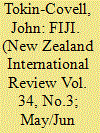

|
|
|
| 16 |
ID:
152530
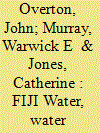

|
|
|
|
|
| Summary/Abstract |
Over recent decades, the demand for bottled water has grown exponentially at the global scale. In the marketing of such products, discourses of purity and paradise have often been invoked. Marketed as a ‘Taste of Paradise’, FIJI Water has gained enormous international success as an ostensibly clean and green product. Celebrity endorsements – reaching as high as US President Barack Obama – have abounded, driven in part by the belief that the corporation is both environmentally and socially responsible. This paper describes and analyses the rise of FIJI water and critically assesses the sources and impacts of its economic success. It goes on to explore its local social and environmental impacts in the context of a country that has been subject to waves of democratic crises where the fate of the polity has been influenced by FIJI Water's actions. FIJI Water has come to assume the role of development trustee in the villages most affected by the growth in exports. The democratic crises in Fiji has given FIJI Water profound developmental influence, and this has brought both costs and benefits at the local socio-environmental scale.
|
|
|
|
|
|
|
|
|
|
|
|
|
|
|
|
| 17 |
ID:
010667
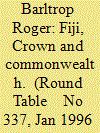

|
|
|
|
|
| Publication |
Jan 1996.
|
| Description |
83-89
|
|
|
|
|
|
|
|
|
|
|
|
|
|
|
|
| 18 |
ID:
016442
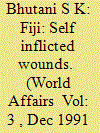

|
|
|
|
|
| Publication |
Dec 1991.
|
| Description |
53-56
|
|
|
|
|
|
|
|
|
|
|
|
|
|
|
|
| 19 |
ID:
161585
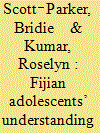

|
|
|
|
|
| Summary/Abstract |
Pacific Island countries are particularly vulnerable to future manifestations of climate change due to high coastline‐to‐land‐area ratios, and high dependence of inhabitants on natural ecosystems. While everyone in the Pacific Islands should participate in climate change adaptation activities, it is the young people, given they are the generation likely to not only bear the burden of climate change, but to lead and live effective climate change adaptation activities and strategies specific to their region, the involvement of youth is critical. Pacific Island youths are often marginalised within traditional decision‐making hierarchies, therefore they are typically excluded from participating in meaningful discussions at community and government levels. Discussions were held with 30 adolescents aged 14–18 years in Fiji to explore knowledge and experiences regarding climate change. Participants revealed their dismay at their inability to talk to family – who they consider are not doing enough – about what they consider as appropriate responses to climate change, recommending the help of an authoritative outsider who could speak to their community leaders and family. Discussions also revealed that Fijian youth could not distinguish between changes in the climate and normal weather events, attesting to the importance of climate‐change education and awareness‐raising efforts within the Pacific Islands more generally.
|
|
|
|
|
|
|
|
|
|
|
|
|
|
|
|
| 20 |
ID:
076601
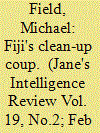

|
|
|
|
|
|
|
|